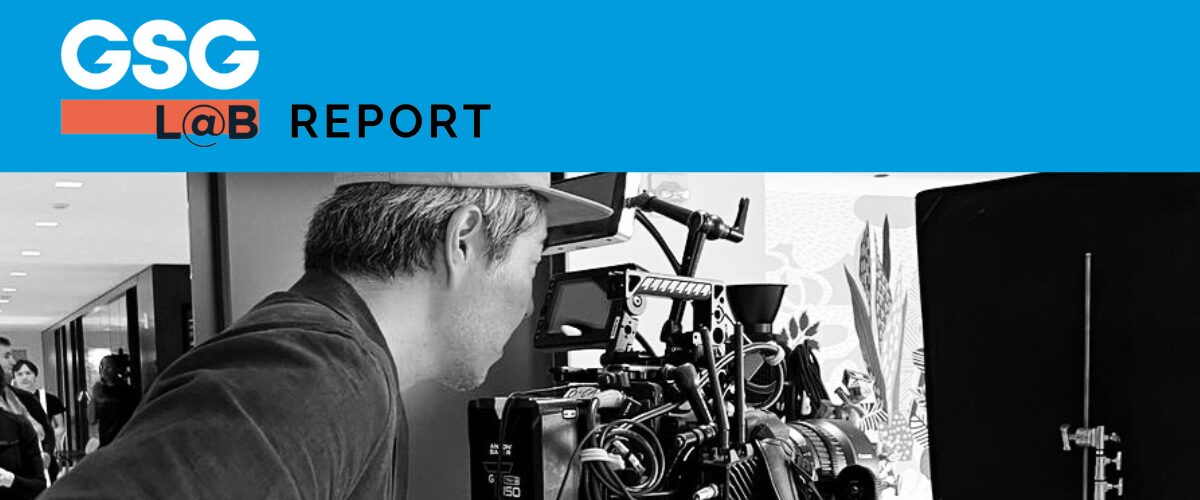
August 14, 2024
Welcome to The L@B Report
Welcome to this month’s issue of The L@B Report from GSG, bringing you news and insights from the intersection of digital media and public affairs. In this issue, we discuss why Google is scrapping its plan to kill the cookie, how organizers used Zoom to rally online for Kamala Harris, and concerns about election misinformation from AI chatbots.
In the News
Google Halts Plan to Eliminate Tracking Cookies from Chrome
The move surprises the advertising industry, which has been preparing for a cookie-free future for years
Google announced in July that it is canceling its plan to phase out third-party tracking cookies from its Chrome web browser. Third-party tracking cookies allow advertisers to track a user’s activity across the web and deliver personalized ads based on their browsing activity. Google will instead introduce a new prompt, similar to Apple’s approach, allowing users to choose how they want to be tracked across Google’s products.
Takeaway
The announcement that Google would scrap its plan to kill off the cookie came as a surprise to the advertising world, signaling that Google was unable to find a solution supported by industry stakeholders. Ultimately, while the cookie seems here to stay, Google’s attempts at replacements over the last four years helped push marketers to prioritize collecting first-party data to use in their targeting, namely email addresses and phone numbers. The efforts also educated users about their privacy regarding cookies, since nearly 40% of Google Chrome users have them. As digital advertisers, we continue to look for cookie-less ways to effectively target content, like contextual advertising, that serves ads based on the content and context of the web page or app in which they appear, rather than on the user’s data.
Relational Organizing Using Social Media and Zoom Generates Millions for Kamala Harris
Zoom highlights the continued relevance of online events in a post-pandemic world
After more than 90,000 Black women rallied on Zoom to organize and raise money for Kamala Harris, several other groups soon organized their own rallies on Zoom using the power of relational organizing on social media and text-messaging applications to get the word out and drive up RSVPs.
“White Women: Answer The Call! Show up for Kamala Harris” broke Zoom’s limit for participants, with more than 100,000 participants raising more than $8.5 million for the campaign. White Dudes for Harris used a combination of Zoom and YouTube Live to stream to more than 190,000 participants and raised $4 million. Hollywood even got in on the act, with Ben Stiller and several other comics hosting a free Zoom rally called “Comics for Harris.”
Takeaway
As Kevin Roose of The New York Times noted, “A month ago, if you had asked me which tech platforms would play a major role in the 2024 presidential campaign, I might have said TikTok or Facebook. I might have said YouTube […] what I wouldn’t have guessed is that this year’s breakout campaign tech would be Zoom.”
In hindsight, Zoom makes a lot of sense. The surge in energy among Democrats and the tight timeframe for organizing made online events an ideal solution, allowing people to gather virtually rather than attempting large in-person meetups—a tactic that Howard Dean’s campaign relied on heavily back in 2003-2004.
While not every campaign will be able to organize an event that draws in the star power of Jeff Bridges and Mark Hamill, the success of these events demonstrates that online gatherings remain a powerful option. In fact, they may offer advantages that offline events can’t match, especially when scaled to reach a wide audience.
AI Chatbots from X’s Grok to ChatGPT Struggle with Election Information
Misinformation on voting and election deadlines adds to worries
In June, a CBS News investigation found that ChatGPT gave incorrect answers to some questions about how to vote in battleground states ahead of the upcoming U.S. presidential election. Similarly, five secretaries of state recently sent a letter to Elon Musk demanding that he fix X’s AI chatbot, Grok, after misinformation about the 2024 election went viral.
Takeaway
X’s false claim that Harris missed ballot deadlines in several states is troubling, but ChatGPT’s inability to provide accurate voting information or direct users to the correct resources is even more alarming, as it could lead to voter disenfranchisement. There are multiple verified websites, ranging from non-profits to government entities that AI can and should be utilizing and at a minimum, the chatbots could direct people to the correct answers on sites such as Vote.org or CanIVote.org.
As we near the election, watch to see if and how campaigns address chatbots in their get-out-the-vote (GOTV) strategy.
More from GSG
Congratulations are in order for two great GSG-led campaigns, both recently named award finalists!
UnidosUS scored a finalist spot for PR Daily’s 2024 Nonprofit Communications Awards, recognizing last year’s successful launch of their Home Ownership Means Equity (HOME) initiative. GSG continues to work alongside this incredible nonprofit in their mission to advance Latino homeownership in the United States.
GSG’s collaboration with the American Association for the Advancement of Science to support STEMM Opportunity Alliance, a national initiative to achieve equity in the STEMM ecosystem by 2050, has been named a finalist in the 2024 PRNEWS Platinum Awards. Our ongoing work aims to help historically excluded and marginalized communities thrive in STEMM fields – and we can’t wait for more wins along the way.
This issue of The L@B Report was put together by Ryan Alexander.
Follow us on Instagram for more updates!